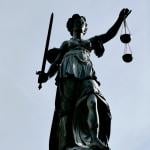Peter Olivi set out a scheme of prophecy chronology from Adam to Abraham to the destruction of Jerusalem. The accuracy of this is not the point, but rather the claim that the end of the temple was a decisive redemptive-historical event. “Ab Adam usque ad primam primissionem factam Abrahe, Genesis XII, sunt precise duo milia anni. Ab illa autem promissione usque ad mortem Vespasiani imperatoris sub quo destructum est templum, sunt iterum duo milia anni . . . a prima... Read more
















